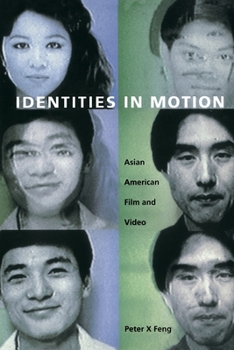Identities in Motion: Asian American Film and Video
Select Format
Select Condition 
Book Overview
This innovative book shows how Asian American filmmakers and videomakers frame and are framed by history-how they define and are defined by cinematic projections of Asian American identity. Combining close readings of films and videos, sophisticated cultural analyses, and detailed production histories that reveal the complex forces at play in the making and distributing of these movies, Identities in Motion offers an illuminating interpretative...
Format:Paperback
Language:English
ISBN:0822329964
ISBN13:9780822329961
Release Date:August 2002
Publisher:Duke University Press
Length:304 Pages
Weight:1.20 lbs.
Dimensions:0.8" x 6.3" x 9.2"
Customer Reviews
1 rating
A Must Read for Asian Americans, film students, and anyone who has admired or questioned an Asian Am
Published by Thriftbooks.com User , 15 years ago
I was driven to read this book by the author's appearance on Turner Classic Movies' month-long "Asian Images in Film: Race & Hollywood" (June 2008). When Mr. Feng was asked to comment on or introduce each film he selected, I felt he wanted to say more, but was tempered by the constraints of mainstream programming demographics. So I feverishly acquired this book and, I'm happy to say, it does not disappoint. Any Asian American who has ever watched the sparse appearances of their "representation" on the American screen, and was confounded - time and again- by the misrepresentation, will find a clear and cogent analysis to their situation in Identities In Motion. I found myself often nodding in agreement throughout the book, as the author articulated the problems inherent in films about and by Asian Americans. Feng argues that one shouldn't look to Asian American movies as historical truth or depictions of fixed identities. Instead, he inspects Homi Bhaba's term "splitting" to separate the repetition of colonial discourse from the resistance to that discourse. Viewed under these conditions, Asian American movies may be read as one would read literary criticism, as opposed to literature. For example, he mentions that certain "historical" Asian American movies reveal more about the politics involving Asian Americans (at the time the movie was made), than "the historical periods they purport to represent." It's a tough task to break free of that discourse; some Asian American movies fare better than others in resistance, thereby escaping the trap. A range of movies from what may be perceived as biographical videos (aka Don Bonus, China: Land of My Father, Made In China, The Way to My Father's Village, From Hollywood to Hanoi) to feature films about immigrant lives (Thousand Pieces of Gold, Picture Bride), the Japanese Internment (History and Memory, A Family Gathering), commercial films (Wedding Banquet, Joy Luck Club), and the well-crafted, successfully metadiscursive films (Chan is Missing, Surname Vien Given Name Nam) are interrogated. The book is written in an academic tone, with wording that sometimes seems densely packed. Don't let it intimidate you; Identities In Motion is a rewarding read. Even if one manages to absorb a small percentage of Peter Feng's observations (many of which also come in easy-to-digest sentences), his or her perception of the Asian American landscape (and an awareness of why and how you arrived at the identity of "other" if you are an Asian American) will be vastly altered. When the author quotes Charlie Chan "perfect crime like perfect doughnut - always has a hole," we can apply it to the mission of this book. If cinematic representation is seen as that crime, then Identities In Motion shows you how to find the hole.




